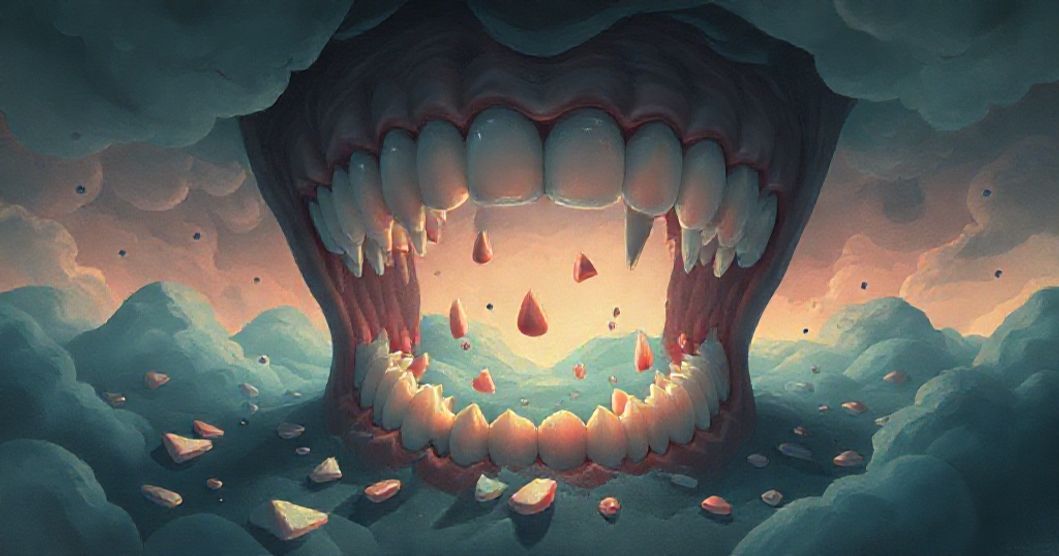Part 1: Dream Presentation
Dreams often arrive unannounced, carrying symbolic messages from our deeper consciousness. Consider this vivid dream experience: the dreamer recounts a recurring nightmare where teeth fall out during eating, triggering uncontrollable bleeding and leaving them in a state of disoriented panic. In this dream, the setting is mundane—either a kitchen or a restaurant booth—with food that feels familiar and comforting, yet the act of eating becomes the catalyst for a disturbing transformation.
The dream begins with the dreamer engaged in a routine, almost comforting act: eating. The texture of the food is clearly defined—warm, chewy, and familiar—establishing a sense of normalcy that is abruptly shattered. The first sign of trouble is a loose tooth, not painful but undeniably unsettling, followed by its sudden, painless extraction. Blood wells up, not from discomfort but from the raw, exposed socket, creating a metallic, coppery taste in the mouth. As the dream progresses, more teeth fall out with equal ease, triggering a cascade of panic. The dreamer leans forward, desperate to avoid swallowing the blood, yet the bleeding feels uncontrollable. The dream ends with a sense of incomplete resolution, as the dreamer can never recall what happens after this pivotal moment.
Part 2: Clinical Analysis
Want a More Personalized Interpretation?
Get your own AI-powered dream analysis tailored specifically to your dream
🔮Try Dream Analysis FreeThe Symbolic Language of Falling Teeth
Teeth falling out in dreams are among the most universally recognized and emotionally charged symbols in dream psychology. In this specific iteration, the act of eating adds critical context: eating represents nourishment, connection, and the consumption of experiences in waking life. When teeth—the tools of eating and speaking—begin to fall out, the dreamer is metaphorically losing their ability to 'chew through' life’s challenges or 'speak their truth' effectively. The upper jaw teeth, in particular, often symbolize confidence, social presence, and the way we present ourselves to the world. Their sudden loss suggests a crisis of identity or fear of being perceived as inadequate.
The absence of pain but presence of bleeding is equally significant. In dreams, painless bleeding typically indicates emotional rather than physical trauma. The blood here is not a sign of injury but of emotional release—perhaps suppressed feelings, unspoken truths, or unresolved conflicts that are now 'leaking' into awareness. The act of leaning forward to avoid swallowing blood may represent an attempt to 'hold back' emotions or prevent them from overwhelming the dreamer, yet the effort feels futile, mirroring waking life struggles with emotional regulation.
Psychological Frameworks: From Jung to Modern Neuroscience
From a Jungian perspective, teeth falling out align with the archetype of 'death and rebirth,' representing the end of one self and the potential for transformation. The dreamer’s recurring experience suggests a psychological 'unfinished business'—a theme or issue that demands attention. Jung would interpret the falling teeth as a symbol of the 'shadow self' emerging, challenging the dreamer to integrate aspects of themselves they’ve been avoiding.
Freudian theory offers another lens, focusing on repressed anxieties. For Freud, teeth symbolize sexual urges and aggression; their loss could reflect fears of sexual inadequacy or repressed anger. However, the context of eating here expands this interpretation to include fears of 'digesting' difficult experiences—perhaps a recent loss, career change, or relationship shift that feels overwhelming.
Neuroscience adds a practical dimension: dreams during REM sleep help consolidate emotional memories and process stress. The recurring nature of this dream suggests the brain is repeatedly revisiting a stressor, attempting to resolve it. The specific imagery of teeth falling out correlates with the brain’s processing of identity-related anxieties, particularly around self-worth and control.
Emotional Triggers and Life Context
Recurring dreams rarely arise without waking-life triggers. The dreamer’s description of recent occurrences (multiple instances in the past few months) suggests a period of significant change or stress. Teeth falling out often relates to fears of losing control in relationships, work, or personal goals. If the dreamer is experiencing uncertainty in a professional role, for example, the loss of teeth could symbolize losing their 'professional bite' or sense of competence.
The act of eating—usually a solitary, comforting act—becomes a site of vulnerability in the dream. This shift may indicate that the dreamer is struggling to 'nourish' themselves emotionally, perhaps neglecting self-care or avoiding difficult conversations. The recurring nature of the dream suggests these themes are unresolved, with the mind attempting to process them through repetition.
Therapeutic Insights: Navigating the Unfinished Dream
For the dreamer, this recurring nightmare offers an invitation to explore deeper emotional terrain. Journaling exercises can help identify waking triggers: asking, 'When do I feel most vulnerable?' or 'What changes have I been avoiding?' can reveal connections between the dream and real-life stressors.
Reflective questions like 'What would it mean to 'chew through' my current challenges with more confidence?' encourage the dreamer to reframe the loss of teeth as a call to rebuild self-image rather than a sign of failure. Practicing mindfulness around eating—savoring food without distraction—can help translate this dream insight into daily awareness.
Therapeutic techniques like dream incubation (setting an intention before sleep to process a specific issue) or active imagination (engaging with dream symbols creatively) may help resolve the 'unfinished' aspect of the dream. Exploring the symbolic weight of 'falling teeth' in waking life—perhaps through art or conversation—can transform anxiety into actionable self-awareness.
FAQ Section
Q: Why do I keep dreaming about my teeth falling out?
A: Recurring dreams often signal unresolved emotional issues. This dream may reflect anxiety about losing control, self-image concerns, or difficulty 'digesting' recent changes. The repetition suggests your mind is trying to process these themes.
Q: What does the bleeding without pain mean?
A: Painless bleeding in dreams typically represents emotional release rather than physical harm. It may indicate suppressed feelings or unspoken truths needing expression.
Q: How can I stop this recurring dream?
A: Reflect on waking stressors, practice relaxation before sleep, and journal about the dream’s emotions. Visualization exercises (imagining teeth strengthening) can help reframe the symbol into one of resilience rather than loss.
